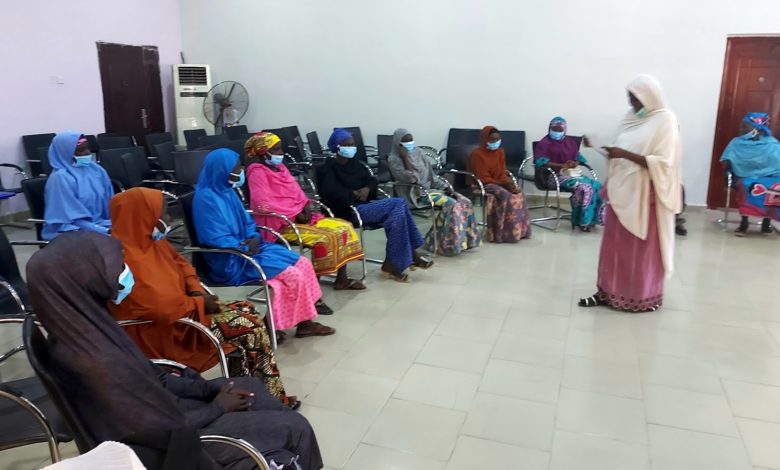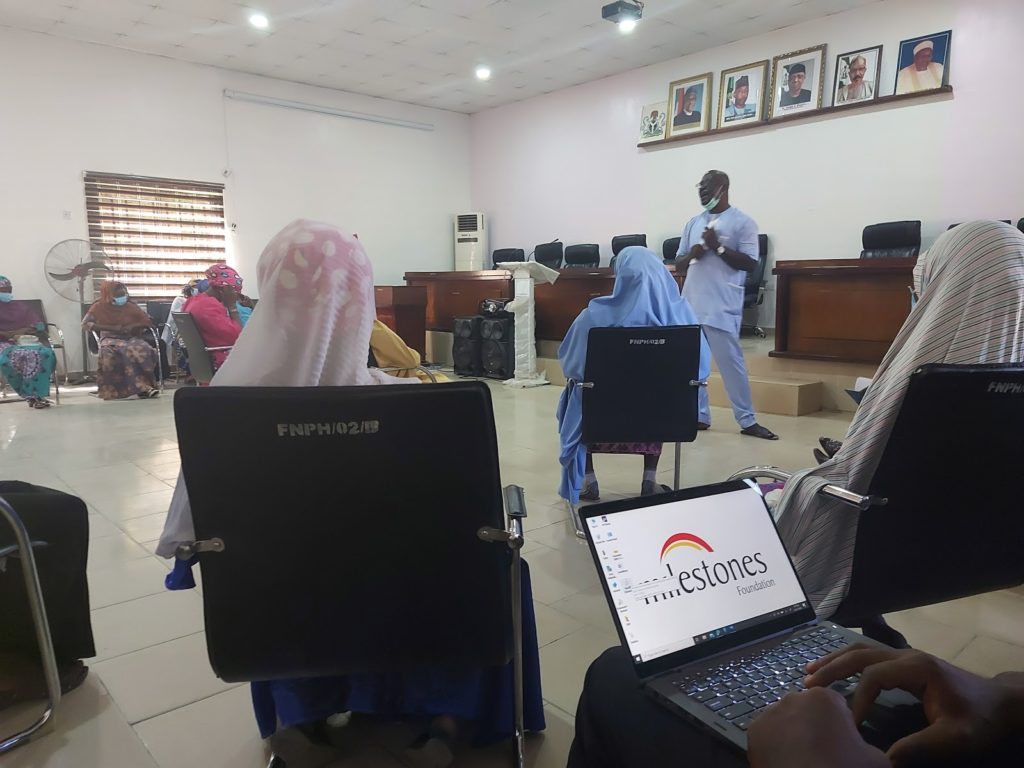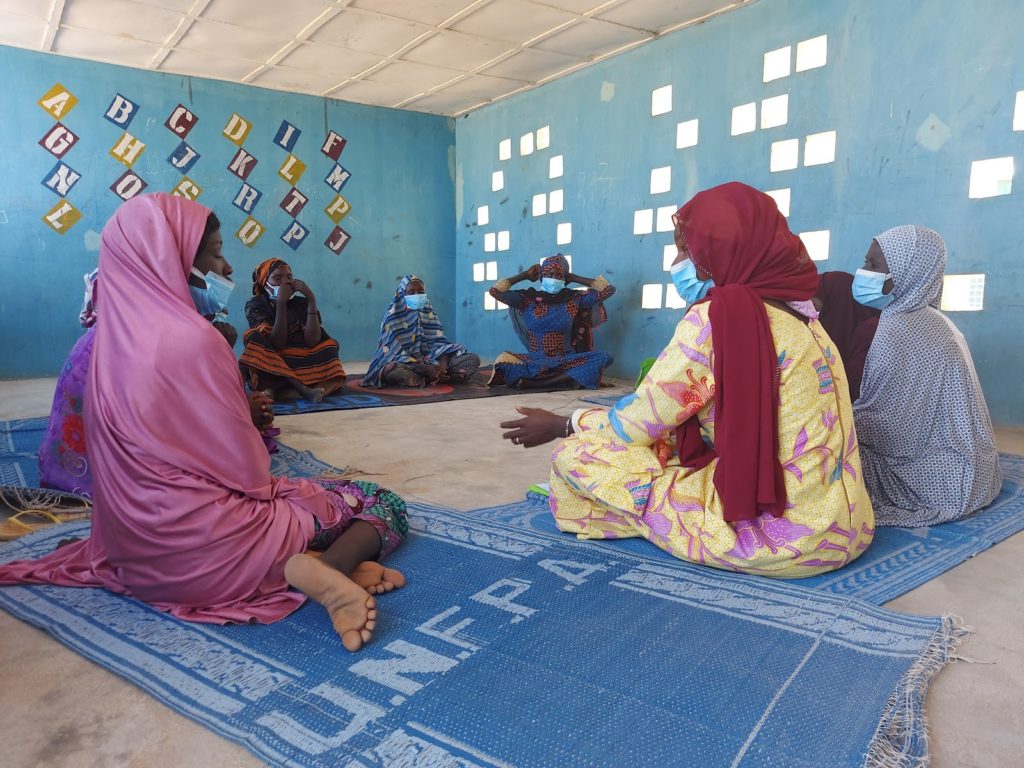Sexual Violence Survivors In Borno Find Succour In ATJLF-Funded Project

When she was only 14 years old, Aisha, a resident of Borno, a state in northeast Nigeria, was kidnapped by Boko Haram members and taken into the forest. She was beaten for trying to escape days into her capture and forcefully married off to one of the insurgents.
“He forced himself into me almost on a daily basis,” she recounted.
“A few weeks later, I started to feel nauseous. I had met an elderly woman who had become like a mother to me. She told me I was pregnant. She took delivery of my baby when I was due. There was no medical support. No food. She gave me only warm water.”
By the time her son was seven months old, Aisha attempted to escape a second time and succeeded. She reunited with her sister, who had also managed to escape from captivity. But her experience of repeated rape and sexual violence while in the terrorist cell still haunts her. She is starting to get better now that she is with friends and has more access to food. But, she says, whenever she closes her eyes, she gets flashbacks that renew her trauma.
Aisha is one of hundreds of women in Borno State who have been victims of sexual and gender-based violence and are receiving help from Milestone Rehabilitation Foundation. The non-profit is currently implementing a project to get survivors healed and reintegrated with support from the African Transitional Justice Legacy Fund (ATJLF).
In 2020, ATJLF had announced that it would be funding projects from four organisations in Nigeria and 38 others across seven countries in West Africa from a pool of about $1.5 million.
“Through these projects, we are ushering in a process that will ultimately reactivate survivor agency, while contributing to rebuilding communities affected by conflicts and dictatorships in the continent, starting with West Africa,” said Makmid Kamara, Director of ATJLF.
The Legacy Fund is an Accra-based public charity that supports organisations in rebuilding communities affected by conflict and aiding transitional justice processes such as accountability, truth-seeking, and reconciliation.
Under the partnership, Milestone Rehabilitation Foundation is expected to provide a platform for displaced women and girls who have suffered sexual violence and exploitation as a result of the Boko Haram insurgency to share their experiences. The women, about 500 IDPs, will also receive psychosocial support to set them on a path to long-term recovery.
Ten displacement camps in Maiduguri, Borno state capital, were selected by the non-profit for this project: Bakassi Camp 1, Bakassi Camp 2, Bakassi Camp 3, Bakassi Camp 4, Dalori Camp 1, Dalori Camp 2, EYN Camp, Farm Centre Camp, NYSC Camp, and Teachers Village Camp.
To get the support of local authorities and stakeholders, the Foundation carried out advocacy visits to different groups, including the Federal Neuro-Psychiatric Hospital in Maiduguri, State Emergency Management Agency (SEMA), State Primary Health Care Development Agency, State Ministry of Women Affairs and Social Development, Nigerian Army Corps, and various IDP camp officials.
The Federal Neuro-Psychiatric Hospital provided trainers who joined the Project Working Team by virtue of their vast experience in dealing with violence-related trauma.
Between November 30 and December 2, a training session was held for 20 volunteers to educate them on transitional justice, the dynamics of sexual violence in conflict areas, ethics and safety during field work, and the Survivor-Focused Intervention Approach.
The trained volunteers, in turn, carried out focus group discussions with 100 displaced girls and women, 10 from each of the selected camps. The discussions fostered understanding of what life is like for women at the camps, incidents of gender-based violence, as well as the availability and effectiveness of measures to address them.
“All the participants reported having experienced some form of Gender Based Violence prior to and during their stay in the IDP Camp,” Milestones noted.
Some of the factors promoting sexual violence that were identified included the distance of women’s washrooms from their shelters, poor lighting in residential areas, and economic hardship. The NGO discovered that most victims of violence do not report the crimes to camp officials and health professionals, and prefer to discuss their experience with trusted friends.
“The most common reason for this approach was that they felt it would make no difference if they reported the issues as there was nothing anyone could do about it,” the Foundation said.
“Discussions revealed that some of the women and girls did not see it as sexual exploitation when they had to sleep with someone in exchange for food items or other necessities. They, however, did not seem to understand that they were entitled to those items.”
Data gathered from 150 randomly selected IDPs showed that, in the 12 months before they arrived at the displacement camp, 97.6 per cent experienced threats of violence, 94 per cent were victims of physical violence, 61.2 per cent were victims of rape, 78 per cent were sexually exploited, and 48 per cent were victims of forced marriage.
On the other hand, within the last one year of their stay at the camps, 92 per cent were threatened with violence, 81 per cent were physically assaulted, 29 per cent said they were raped, 81 per cent were victims of sexual exploitation, and 11.7 per cent underwent forced marriages.
Milestones acknowledged that many of the women desperately needed medical interventions related to their sexual and reproductive health, trauma and grief counselling, social support services, resilience training, and psychiatric intervention for moderate to serious issues.
The NGO offered all screen participants who had experienced gender-based violence brief intervention sessions and referral services, and five participants from each focus group were appointed as peer facilitators for their respective IDP camps.
In December, it went on to train 60 healthcare workers on counselling techniques and procedures, motivational interviewing, client assessment, service referrals, and ethical issues connected to working with survivors of gender-based violence.
Gender-based violence in the northeast is not only perpetrated by terrorists against their abductors, it is also perpetrated by law enforcement officers against those they are supposed to protect, among other classes of people.
Hauwa*, one of the girls who spoke to Milestones’ volunteers, was just 13 when Boko Haram members invaded her home town, killed her father, and displaced her family. When she got to the IDP camp in Maiduguri, a police officer invited her to his house apparently to help with chores. But as soon as she got there, he pushed her into his room.
“He raped me and told me not to tell anyone about it; otherwise he will kill me,” she narrated. “I told my mom, but she told me to keep quiet. He raped me again, but the third time I screamed. Fortunately, some of neighbour heard me and rescued me.”
Few months later, she became pregnant. The police officer pleaded with her not to report him and promised to support her. He did this for a while before he got transferred to a different state. Hauwa’s mom refused to follow up the case.
“People laugh at me,” she said bitterly. “They say I kept going back. It makes me angry. It makes me sad.”
With the intervention of the Milestone Rehabilitation Foundation and ATJLF, girls like her finally have a safe space to share their traumatic experiences without guilt or judgment as well as access to badly needed medical and psychological assistance.
Support Our Journalism
There are millions of ordinary people affected by conflict in Africa whose stories are missing in the mainstream media. HumAngle is determined to tell those challenging and under-reported stories, hoping that the people impacted by these conflicts will find the safety and security they deserve.
To ensure that we continue to provide public service coverage, we have a small favour to ask you. We want you to be part of our journalistic endeavour by contributing a token to us.
Your donation will further promote a robust, free, and independent media.
Donate HereStay Closer To The Stories That Matter







One Comment